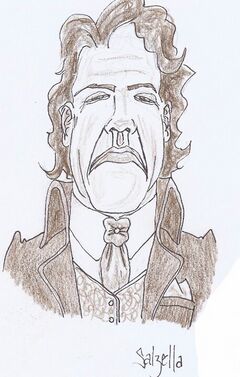Salzella
| Salzella | |
 | |
| Name | Mr. Salzella |
| Race | Human |
| Age | middle-aged |
| Occupation | Opera Director |
| Physical appearance | |
| Residence | Ankh-Morpork |
| Death | As a result of headology |
| Parents | {{{parents}}} |
| Relatives | {{{relatives}}} |
| Children | {{{children}}} |
| Marital Status | {{{marital status}}} |
| Appearances | |
| Books | Maskerade |
| Cameos | {{{cameos}}} |
Mr. Salzella was the Director of the Ankh-Morpork Opera House during the events of Maskerade. He was retained by Mr. Seldom Bucket when he left his flourishing dairy business (was he driven out by Ronald Soak?) and took ownership of the Opera House. Along with Dr Undershaft the Chorus Master, Mr Salzella oversaw much of the artistic endeavour of the ´Opera.
As well as a very talented Director, he was also an embezzler on a grand scale. He secreted huge amounts of the Opera House's money in a stash deep in the cellars. He got away with this for a long time due to being Director, and endlessly explaining to Mr Bucket that opera is expensive. It took a witch with Granny Weatherwax's mind to be able to read the figures and discover what was really going on.
Salzella took the legend of the Opera Ghost and used it to his advantage. He took on the persona, hid behind the mask and the cape, and used the very real sword ruthlessly when he had to. Amongst his victims were Mr Pounder and the aforesaid Dr Undershaft, who both came upon him when he was fulfilling his nefarious purposes.
Throughout the book there are instances when Salzella is surprised by the actions and correspondence of the opera ghost, but this is cleared up by Granny Weatherwax towards the end of the book, when the other life of one Walter Plinge is exposed.
Salzella is eventually found out and proves to be just as "infected" with operatic romanticism as everyone else in the building. Due to the Discworld's literal adherence to the laws of narrative causality, this is not an entirely mental issue: he loses to Granny in a duel in which he had a real sword and she just had her pin-sharp mind, and is then killed in an extremely operatic duel with the "real" Ghost and spends two pages on a final monologue before keeling over. He only has a sword theatrically thrust under his armpit, but according to the witches present, fails to notice this.
Annotation
A Roundworld reference to Antonio Salieri whose surname means "seller of salt" (lit. Sal-s(z)ella). Salieri was an Italian classical composer, conductor and teacher born in the Republic of Venice, but who spent his adult life and career as a faithful subject of the Habsburg Monarchy. He was a pivotal figure in the development of late 18th century opera. He was one of the most important and sought after teachers of his generation and his influence was felt in every aspect of Vienna's musical life. Schubert, Beethoven, and Liszt were among the most famous of his pupils.
Salieri's music slowly disappeared from the repertoire between 1800 and 1868, and was rarely heard after that period until the revival of his fame in the late 20th century. This revival was due to his dramatic and highly fictionalized depiction in the play and film Amadeus (1979, 1984) by Peter Shaffer in which he resents Wolfgang Amadeus Mozart's fame and talent. In reality he was his friend and supporter.